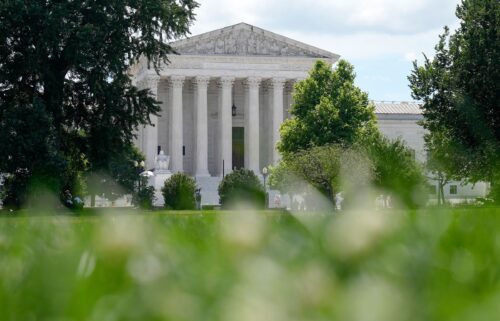Five weeks to Election Day, pre-election voting looks set to decline from pandemic-era highs
By Ethan Cohen, Molly English and Matt Holt, CNN
(CNN) — While there are still five weeks until Election Day, voting is already underway across the country and a CNN review suggests pre-election voting this year will drop from the pandemic-era highs of 2020.
More than 500,000 votes have already been cast as of Tuesday in 27 states for which data was available, according to election officials, Edison Research and Catalist, a company that provides data, analytics and other services to Democrats, academics and nonprofit advocacy groups, including insights into who is voting before November.
That’s a tiny fraction of the roughly 158 million votes cast for president in the 2020 election.
In the 35 states and the District of Columbia where data is available, more than 53 million pre-election ballots have been requested by voters so far, including in states where all voters receive a ballot in the mail. But across the board, ballot requests are down from where they were at this point four years ago, according to Catalist’s data.
While early voting data is not predictive of ultimate outcomes, it can give a good picture of “general trends” across voters of different ages, genders and races in the lead-up to the election, Catalist CEO Michael Frias told CNN.
The downtick in interest in early voting so far shouldn’t be surprising.
The 2020 election featured historic levels of pre-election voting during the COVID-19 pandemic. Some voters were wary to vote in-person with guidelines from the Centers of Disease Control and Prevention recommending social distancing. Four years later, with the country out of the pandemic, more voters could be heading back to the ballot box for in-person voting either before or on Election Day.
That shift is evident in how older voters make up a larger share of people requesting ballots so far, compared with this point in 2020.
In Georgia, voters 65 and over for 58% of requests, up from 47% in 2020. In Michigan, they account for 53%, up from 41%. In Pennsylvania, voters 65 and over account for 49% of ballots requested so far, up from 38% in 2020. And in Wisconsin, 45% of requests came from these voters, up from 34% in 2020. While fewer voters of all ages are requesting ballots so far this year, the drop has been far smaller among this oldest group of voters.
During the pandemic, mail voting was more widespread among all age groups.
Partisan breakdown
While Democrats had a wide advantage over Republicans in pre-election voting four years ago, there’s some early evidence that the gap may not end up being quite so wide this year.
Generally, in recent election cycles, Democrats nationwide have shown a preference to cast their ballots in advance, while many Republicans opt to vote on Election Day.
But since 2020, Republicans have been trying to convince their supporters to bank their votes early, despite former President Donald Trump’s baseless claims that mail voting is rife with fraud.
In the crucial battleground state of Pennsylvania, Democrats have requested 62% of all ballots, according to the latest Catalist data, while Republicans have requested 26%. However, at the same point in the 2020 election, Democrats accounted for 65% of all ballot requests, while Republicans accounted for 24%.
In Florida, once a key battleground state that has become less competitive for Democrats, there’s a similar trend. Democrats account for 42% of the ballots requested, the most recent Catalist data showed, slightly down from 44% at the same point in 2020. Republicans account for 35% of requests, up from 33% in 2020, and those without a party affiliation made up 20% of requests, down from 22% in 2020.
Early in-person voting hasn’t yet started in most of the country, and in recent years Republicans have shown they’re more likely to vote early in person than by mail.
While partisan data on early voting is only available in states that allow voters to register by party, data by race is more widely available.
In the key states of Georgia, Michigan, Pennsylvania and Wisconsin, the racial breakdown of voters requesting ballots is almost identical to what it was at this point in 2020.
The story is slightly different in Florida, where White voters make up a slightly larger share of those requesting pre-election ballots compared with this point in 2020 (74% versus 69%), with Latino voters (13% vs. 16%) and Black voters (10% vs. 12%) making up slightly smaller shares.
Comparing data for 2024 with 2020 is not as straightforward as it has been in previous election cycles, according to Catalist’s Frias, since early and mail voting four years ago was heavily affected by the COVID-19 pandemic.
“It’s going to be a relatively normal election, meaning you didn’t have a pandemic, you didn’t have an outside event that was forcing people inside and reducing the amount of in-person activity,” Frias said.
But the data is still useful to both the Trump and Harris campaigns, giving them a small peek into just how successful they’ve been so far in reaching key voter demographics.
“The campaigns have been executing outreach to voters for the entire year,” Frias said. “This is the first real opportunity that they have to see the folks that they’re talking to.”
This story has been updated with additional information.
The-CNN-Wire
™ & © 2024 Cable News Network, Inc., a Warner Bros. Discovery Company. All rights reserved.

